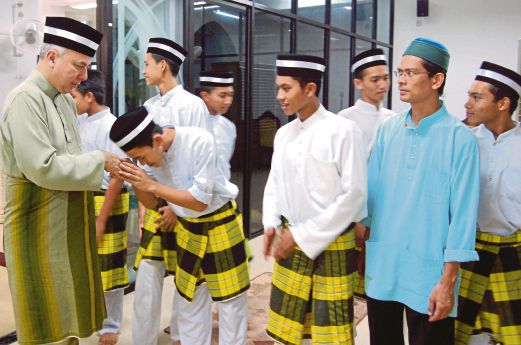Al-Quran, a life-learning culture: Sultan Nazrin
14 July 2014 @ 9:53 PM
SUNGAI
SIPUT: Leadership and administration that make Al-Quran as the main
source of reference and governance compass will be able to develop the
ummah and the country which will continue to receive blessings of Allah,
Sultan of Perak Sultan Nazrin Shah said.
He said only by referring to the Quran, the country’s leadership and administration would be able to observe transparency, sincerity, honesty and integrity while discharging their duties to the people and their obligations as the servants of Allah.
“Al-Quran is not just a book to be read, it must also be understood, observed and should be made the main source of reference and a compass for human to govern their lives and the environment...with the realisation that every speech and action will be recorded by the angels as evidence in the Court of Mahsyar on the Day of Resurrection.”
He said this when gracing the state-level Nuzul Al-Quran celebration and launching the Ghufraniah Mosque here today.
Also present were Raja Muda of Perak Raja Jaafar Raja Muda Musa and Raja Di-Hilir Perak Raja Iskandar Dzulkarnain Sultan Idris.
Sultan Nazrin also said Muslims should be brave and prepared to make changes and improvement towards the teaching and learning of Al-Quran so that the spirit of the holy book could be inculcated in every living soul, hence improve the appreciation of Quran as the main source of reference.
He said the modern-day method of teaching and learning the Quran was probably the factor for the Quran to be less understood, under-appreciated and less applied in the lives of Muslims.
“Muslim children are taught to read the Quran and to complete reading it as soon as possible. Some with vast potential are even pushed to become qari and qariah. Some are able to memorise verses from the Quran for prayers and some are even blessed with the ability to memorise the whole content of Quran,” he said.
However, only a few had pursued Quran studies and even fewer had really observed and capable of appreciating and applying Quran as a way of life and culture, he said.
“If the valuable lessons in Al-Quran were to be found, it is important that the teaching of Al-Quran focuses more on the aspects of understanding, observation, appreciation and practice,” he said.
“The teaching and learning of Al-Quran should not stop after the completion of the 30 juzuk (chapters), but must be made a life-learning culture,” he added.
– BERNAMA
He said only by referring to the Quran, the country’s leadership and administration would be able to observe transparency, sincerity, honesty and integrity while discharging their duties to the people and their obligations as the servants of Allah.
“Al-Quran is not just a book to be read, it must also be understood, observed and should be made the main source of reference and a compass for human to govern their lives and the environment...with the realisation that every speech and action will be recorded by the angels as evidence in the Court of Mahsyar on the Day of Resurrection.”
He said this when gracing the state-level Nuzul Al-Quran celebration and launching the Ghufraniah Mosque here today.
Also present were Raja Muda of Perak Raja Jaafar Raja Muda Musa and Raja Di-Hilir Perak Raja Iskandar Dzulkarnain Sultan Idris.
Sultan Nazrin also said Muslims should be brave and prepared to make changes and improvement towards the teaching and learning of Al-Quran so that the spirit of the holy book could be inculcated in every living soul, hence improve the appreciation of Quran as the main source of reference.
He said the modern-day method of teaching and learning the Quran was probably the factor for the Quran to be less understood, under-appreciated and less applied in the lives of Muslims.
“Muslim children are taught to read the Quran and to complete reading it as soon as possible. Some with vast potential are even pushed to become qari and qariah. Some are able to memorise verses from the Quran for prayers and some are even blessed with the ability to memorise the whole content of Quran,” he said.
However, only a few had pursued Quran studies and even fewer had really observed and capable of appreciating and applying Quran as a way of life and culture, he said.
“If the valuable lessons in Al-Quran were to be found, it is important that the teaching of Al-Quran focuses more on the aspects of understanding, observation, appreciation and practice,” he said.
“The teaching and learning of Al-Quran should not stop after the completion of the 30 juzuk (chapters), but must be made a life-learning culture,” he added.
– BERNAMA

Sultan Nazrin Shah meeting the students at the Nuzul Al-Quran celebration-- Pix by Supian Ahmad.
New Straits Time
Tuesday 15 July 2014.


No comments:
Post a Comment